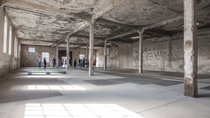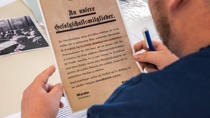Ludwigshafen
Remember. Reflect. Rethink.
Launched in 2021, “Remember. Reflect. Rethink.” has firmly established a forward-looking culture of remembrance at BASF. The initiative references the historic crimes committed by I.G. Farben during the Nazi regime – with a particular focus on the Ludwigshafen/Oppau sites and their employees.
Through the initiative at its Ludwigshafen headquarters, BASF consolidates critical analysis of the history of the site – then part of I.G. Farben – and of the related aspects of discrimination and exploitation. BASF encourages a scientific approach to dealing with the past. A culture of remembrance that is incorporated into every life is also a clear mission for today and tomorrow. That is why BASF is creating a space for employees to reflect on themselves and enter into dialog about how society can live together harmoniously.
Remember - Yesterday
BASF keeps alive the memory of the victims of forced labor during the Nazi regime and the Holocaust. It openly informs people of the Ludwigshafen site’s Nazi past as part of I.G. Farbenindustrie AG and of its involvement in the regime’s crimes.
Reflect - Today
BASF is committed to its historic responsibility. Fully conscious of its site’s history, BASF encourages critical discussion of social exclusion and other antidemocratic trends.
Rethink - Tomorrow
The initiative promotes tolerance, respect and diversity at BASF and reinforces openness as a corporate value. In open dialog, BASF employees scrutinize their own viewpoints and discuss specific courses of action for the company and society.
The initiative was officially launched with the laying of a Stolperschwelle (stumbling block, article in German only) in front of the Visitor Center at BASF’s headquarters on May 25, 2021. Its patrons are Katja Scharpwinkel, a member of BASF’s Board of Executive Directors and Ludwigshafen Site Director, and Sinischa Horvat, Chairman of the BASF Works Council.
We take our responsibility seriously. We want to take this knowledge of the past and look to the future. Discrimination and extremism in all of their forms have no place at BASF.
Without history, there is no future. That is why we in the Works Council actively work within our company to achieve social cohesion and a world without discrimination.
Activities and programs offered by the initiative
Seminars & talks
- Full-day seminars for BASF employees from the Ludwigshafen site at the Osthofen Concentration Camp Memorial
- Expert talks for employees and external participants
Documentation
- Internal documentation from BASF Corporate History
- Internal remembrance and employee communication to mark Holocaust Remembrance Day
- Interviews with Auschwitz survivors
Networking & support
- Support for local projects aimed at fostering a culture of remembrance
- Collaboration and exchange with local and national institutions and companies
Seminars for BASF employees
At the heart of the initiative are seminars for BASF employees at the Ludwigshafen site. These are particularly aimed at apprentices and students on dual study programs, as well as members of the Works Council and union representatives. More than 200 employees took part in the seminars in 2022 and 2023.
BASF Corporate History developed their content in collaboration with the Fritz Bauer Institute and the Osthofen Concentration Camp Memorial. Split into three parts, the seminar examines the history of the former concentration camp and the destruction of democracy in 1933, BASF as a part of I.G. Farben and the company’s crimes during the Nazi regime, and links this to the challenges of antisemitism and racism that society faces today.
The Osthofen concentration camp near Worms was one of the first camps built by the Nazis. It is now a place of remembrance, documentation, research and education on the Nazi period for the state of Rhineland-Palatinate.
Prisoner 116 927
All over the world, victims of the Holocaust are remembered every year on January 27 – the anniversary of the day in 1945 when Soviet soldiers liberated the Auschwitz concentration and extermination camp. To mark this day of remembrance, colleagues from the initiative spoke to Albrecht Weinberg, one of the last survivors of the I.G. Farben concentration camp in Auschwitz.
Albrecht Weinberg tells his story in the film. It is a story that must never be repeated.




